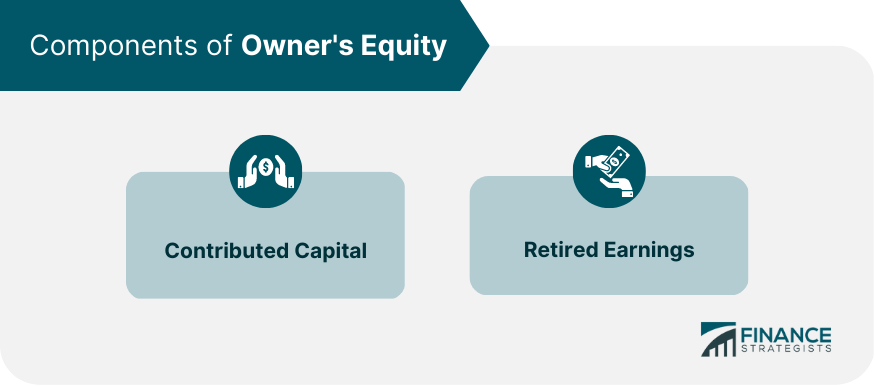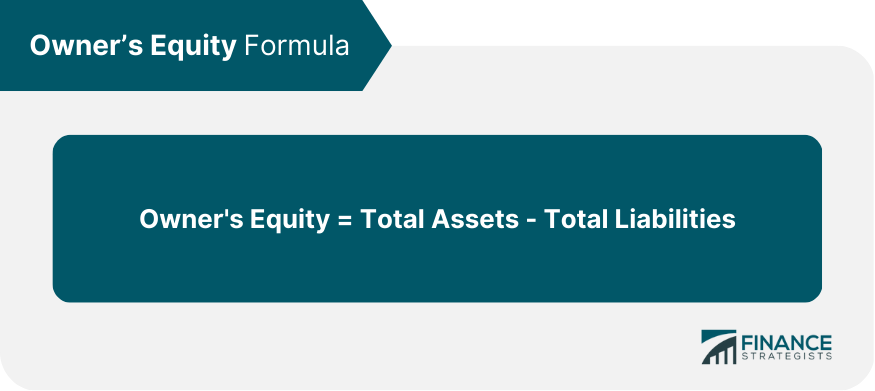Owner's equity refers to the residual claim on assets that remain after all liabilities have been settled. It is the amount of money that belongs to the owners or shareholders of a business. The term is often used interchangeably with shareholder equity or stockholders' equity. This concept is important because it represents the ownership interest in a company and is a key metric for evaluating the financial health of a business. Owner's equity is a critical component of a company's balance sheet. The balance sheet provides important information about the company's financial position, the amount of capital contributed by the owners, the amount of profit retained by the company, and the amount of money paid out to shareholders as dividends. Understanding the components of owner's equity is important for evaluating the financial performance of a business, as well as for making strategic decisions related to growth, financing, and operations. Owner’s equity has the following components: Contributed capital refers to the funds that have been invested in a company by its owners or shareholders in exchange for equity. It represents the total amount of money that has been contributed to a company by its investors through the issuance of stock. Contributed capital is typically divided into two categories: common stock and preferred stock. Common stock is the most basic form of ownership in a corporation and represents the ownership interest in a company that is available to the general public. It is a form of equity financing that carries voting rights that allow shareholders to participate in important decisions related to the company's operations. Common stockholders are entitled to receive dividends, but only after preferred stockholders have been paid their dividends. Preferred stock, on the other hand, receives a fixed dividend that is paid before any dividends are paid to common stockholders. In addition, in the event of a liquidation, preferred stockholders have priority over common stockholders in the distribution of assets. Preferred stock may be more attractive to investors who are looking for a fixed income stream, but it carries less potential for capital appreciation than common stock. Retained earnings refer to the portion of a company's profits that are not paid out as dividends but are instead reinvested in the business. Retained earnings can be used for a variety of purposes, such as financing growth, expanding operations, or paying down debt. It represents the cumulative total of all the profits that a company has earned but has chosen to keep rather than distribute to shareholders. A company with consistently high levels of retained earnings may be better positioned to weather economic downturns. By retaining earnings, a company can finance its growth without having to rely on external financing, such as debt or equity financing. It is an important metric for evaluating a company's financial health and its potential for future growth. Owner's equity is determined by subtracting a company's total liabilities from its total assets. The resulting value represents the residual claim on assets that remains after all liabilities have been settled. In other words, it is the amount of money that belongs to the owners or shareholders of a business. This metric is a key component of a company's financial statement analysis as it provides important information about the company's financial position. For example, if a company has total assets of $1,000,000 and total liabilities of $500,000, its owner's equity would be calculated as follows: Owner's Equity = Total Assets - Total Liabilities = $1,000,000 - $500,000 = $500,000 This calculation indicates that the owners of the company have a residual claim of $500,000 on the company's assets after all liabilities have been settled. The higher the owner's equity, the stronger the financial position of the company. A high level of owner's equity is an indication that a company has a strong financial position and is better positioned to meet its financial obligations. Conversely, a low level of Owner's Equity may be an indication that a company is carrying too much debt and may be at risk of financial difficulties. Owner's equity plays a crucial role in financial analysis as it provides valuable information about a company's financial health and its ability to meet its financial obligations. It represents the residual claim on assets that remains after all liabilities have been settled. It is, therefore, an important measure of the value of a company's assets that are owned by shareholders. One of the key uses of Owner's Equity in financial analysis is to calculate the debt-to-equity ratio. The debt-to-equity ratio is a measure of a company's financial risk and is calculated by dividing a company's total debt by its total equity. A high debt-to-equity ratio indicates that a company is relying heavily on debt to finance its operations, which may be a cause for concern for investors. On the other hand, a low debt-to-equity ratio may indicate that a company has a strong financial position and is less likely to encounter financial difficulties. Investors can gain valuable insights into a company's financial position. Owner's equity is a crucial component of a company's balance sheet that represents the residual claim on assets that remains after all liabilities have been settled. This metric provides valuable insights into a company's ownership structure and financial position. The two components of owner's equity are contributed capital and retained earnings. Contributed capital includes both common and preferred stock, while retained earnings represent the portion of a company's profits that have not been paid out as dividends. The formula for calculating owner's equity involves subtracting total liabilities from total assets. The resulting value represents the residual claim on assets that remains after all liabilities have been settled. It plays a critical role in financial analysis, as it provides important information about a company's financial health and its ability to meet its financial obligations. It also evaluates a company's financial risk and potential for growth.Definition of Owner's Equity
Components of Owner's Equity
Contributed Capital
Retired Earnings

Calculation of Owner's Equity

Examples of Calculations
Role of Owner's Equity in Financial Analysis
Final Thoughts
A wealth management specialist can provide expert guidance and may help understand the concept of owner’s equity in an individual's entire financial needs and circumstances.
Owner’s Equity FAQs
Owner's equity is a financial metric that represents the residual claim on assets that remains after all liabilities have been settled. It provides important insights into a company's ownership structure and financial position.
The two components of owner's equity are contributed capital and retained earnings. Contributed capital includes both common and preferred stock, while retained earnings represent the portion of a company's profits that have not been paid out as dividends.
To calculate owner's equity, the total assets of a business are summed up, and the total liabilities are deducted from this amount. This process provides a measure of the residual claim on assets that remains after all liabilities have been settled.
It provides important information about a company's financial health and its ability to meet its financial obligations. It is used to calculate the debt-to-equity ratio and the return on equity ratio, both of which are important metrics for assessing a company's financial risk and potential for growth.
It is important for investors as it provides valuable insights into a company's financial position and potential for growth. By evaluating the components and calculation of this metric, investors can assess the potential risks and rewards of investing in a particular company and make informed investment decisions.
True Tamplin is a published author, public speaker, CEO of UpDigital, and founder of Finance Strategists.
True is a Certified Educator in Personal Finance (CEPF®), author of The Handy Financial Ratios Guide, a member of the Society for Advancing Business Editing and Writing, contributes to his financial education site, Finance Strategists, and has spoken to various financial communities such as the CFA Institute, as well as university students like his Alma mater, Biola University, where he received a bachelor of science in business and data analytics.
To learn more about True, visit his personal website or view his author profiles on Amazon, Nasdaq and Forbes.















